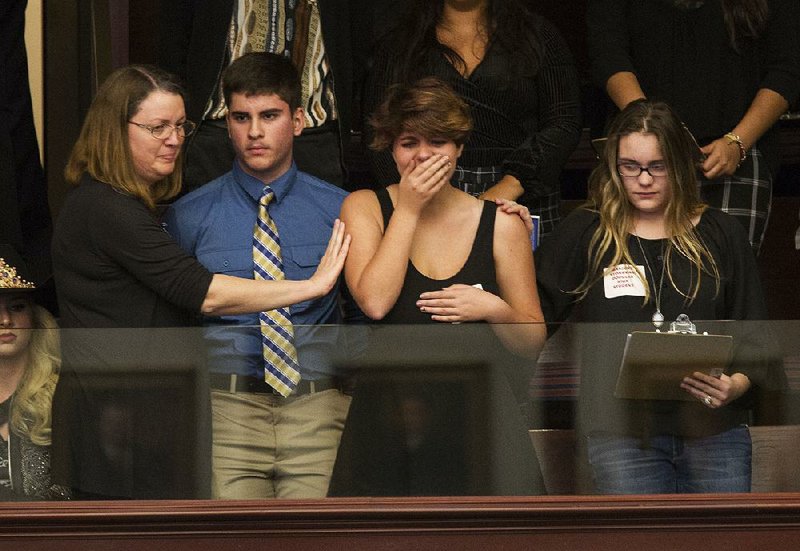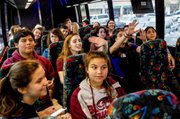PARKLAND, Fla. -- Students who survived last week's school shooting in Florida traveled Tuesday to the Florida capital to press lawmakers for gun-control legislation to prevent another massacre. But within hours, the gun-friendly Legislature had effectively halted any possibility in the near future of banning assault-style rifles like the one used in the school attack.
The legislative action further energized the teens as they prepared to confront legislators who have quashed gun-control efforts for decades in a state where 1.3 million people have concealed-carry permits.
"They're voting to have shootings continually happen. These people who voted down the bill haven't experienced what we did. I want to say to them, 'It could be you,'" 16-year-old Noah Kaufman said as he made the 400-mile trip to Tallahassee.
Three buses carried 100 students who, in the aftermath of the attack that killed 17 people, want to revive the gun-control movement. The teens carried sleeping bags and pillows, and hugged their parents as they departed, many wearing burgundy T-shirts in their school colors.
Click here for larger versions
Photos by The Associated Press
Photos by The Associated Press
They spent the seven-hour ride checking their phones, watching videos and reading comments on social media about the shooting, some of which accused them of being liberal pawns.
Meanwhile at the Statehouse, a Democratic representative asked for a procedural move that would have allowed the Republican-controlled House to consider a ban on large-capacity magazines and rifles such as the AR-15 that was wielded by the shooting suspect Nikolas Cruz.
The bill had been assigned to three committees but was not scheduled for a hearing. The House quickly rejected the Democratic motion. The vote was along party lines, and Republicans criticized Democrats for forcing the vote.
Because the committees will not meet again before the legislative session ends March 9, the move essentially extinguishes hope that lawmakers will vote on any sweeping measures to restrict assault-style rifles, although other proposals could still be considered.
"No one in the world with the slightest little hint of a soul isn't moved by this tragedy," Republican strategist Rick Wilson said. "The discussion has to be a longer, bigger and broader discussion."
Lizzie Eaton, a junior at Marjory Stoneman Douglas High School, spent the day lobbying senators of both parties and concluded that lawmakers were "just not listening to us."
The vote was "heartbreaking," she said. "But we're not going to stop."
The students planned to hold a rally today to put more pressure on the Legislature.
[PRESIDENT TRUMP: Timeline, appointments, executive orders + guide to actions in first year]
"I really think they are going to hear us out," said Chris Grady, a high school senior who was on the bus.
GUN CONTROL RESISTANCE
The Feb. 14 attack initially appeared to overcome the resistance of some in the state's political leadership, which has rebuffed gun restrictions since Republicans took control of the governor's office and the Legislature in 1999.
However, many members of the party still have strong resistance to any gun-control measures.
Republican leaders in the House and Senate have said they will consider raising age restrictions for gun purchases and temporarily revoke someone's guns if that person is deemed a threat to others. Gov. Rick Scott, a Republican, convened groups assigned to propose measures for protecting schools from gun violence.
The lawmakers already face a small window to pass any bill with just 2½ weeks left in the legislative session. Meanwhile, some lawmakers who are thinking of running on a statewide ticket are mindful of their sensitive positions, since gun owners make up huge voting blocs in some parts of the state, especially the Panhandle.
Wilson said he knows the students "want something to happen," and they need "a moment to come and make their case."
But, he said, "the thought that you get to wave a wand and change the law is something that is probably going to collide with reality."
The Parkland students also plan to meet today with top legislative leaders, including Senate President Joe Negron.
Florida has a reputation for expanding gun rights. Negron sponsored a 2011 bill that Scott signed into law that banned cities and counties from regulating gun and ammunition sales.
Authorities say Cruz, 19, had a string of run-ins with school authorities that ended with his expulsion. Police were repeatedly called to his house throughout his childhood. His lawyers said there were many warning signs that he was mentally unstable and potentially violent. Yet he legally purchased a semiautomatic rifle.
The Senate is also considering boosting spending on mental health programs for schools and giving law-enforcement greater power to involuntarily hold someone considered a danger to themselves. The chamber will also look at a proposal to deputize a teacher or someone else at school so they are authorized to have a gun.
Kyle Kashuv, a 16-year-old student at the high school, said he was pro-gun before the shooting.
"I had no issue with anyone having a gun of any caliber," said Kashuv, as he rode in the bus to Tallahassee. "I was all for it. But after the situation, I realized we have some issues in our society and it has to be addressed."
BUMP STOCKS
President Donald Trump on Tuesday ordered the Justice Department to propose regulations to ban so-called bump stocks, which can convert semiautomatic guns into automatic weapons like the one used last year in the massacre of concertgoers in Las Vegas.
Speaking at the White House days after the Florida shooting, Trump said he had directed Attorney General Jeff Sessions to develop the regulations.
"We cannot merely take actions that make us feel like we are making a difference," Trump said at a ceremony as he conferred the medal of valor on public safety officials. "We must actually make a difference."
After the shooting in Las Vegas, congressional Republicans and the National Rifle Association, which for years has resisted changes in gun control legislation, expressed a willingness to consider a ban on bump stocks.
The White House had said last year that the Bureau of Alcohol, Tobacco, Firearms and Explosives was performing a review of whether it could regulate bump stocks after the shooting in Las Vegas, which killed dozens of people. Even as Trump was speaking Tuesday, a bureau official told a reporter that the review was ongoing.
But the president said he had signed a memorandum Tuesday effectively short-circuiting that review.
The Justice Department, reacting to Trump's memo, said in a statement that it "understands this is a priority for the president and has acted quickly to move through the rulemaking process. We look forward to the results of that process as soon as it is duly completed."
In a tweet Tuesday night, Trump indicated that he wants to strengthen the background check system, but he offered no specifics.
"Whether we are Republican or Democrat, we must now focus on strengthening Background Checks!"
Asked at a news briefing Tuesday if Trump was open to reinstating a ban on assault-style weapons, press secretary Sarah Huckabee Sanders said White House officials "haven't closed the door on any front." She also said the idea of raising the age limit to buy an AR-15 was "on the table for us to discuss."
Separately, the U.S. Supreme Court announced that it will not review California's 10-day waiting period for firearm sales, prompting Justice Clarence Thomas to say his colleagues are turning the Second Amendment into a "disfavored right."
Thomas was alone among the justices to note his dissent from the court's refusal to review a ruling from the U.S. Court of Appeals upholding California's law, which is similar to one in the District of Columbia and eight other states.
Thomas' 14-page dissent illustrates the court's reluctance to engage in challenges to restrictions on gun ownership and use, many of which have been upheld by lower courts without Supreme Court review.
"The right to keep and bear arms is apparently this court's constitutional orphan," Thomas wrote.
With limited exceptions, California requires a 10-day waiting period for the purchase of any firearm. The state says it needs the time to complete background checks and for a "cooling off period" for those who might be buying a gun to hurt themselves or others.
The justices also turned aside an NRA challenge to a California law that imposes a fee on firearm sales and transfers, and uses some of the money to track down illegally owned weapons.
The state said that since 2013, it has seized more than 18,000 firearms from individuals who are legally barred from owning guns.
Information for this article was contributed by Brendan Farrington, Josh Replogle, Tamara Lush, Gary Fineout, Sadie Gurman, Catherine Lucey, Ken Thomas and Jonathan Lemire of The Associated Press; by Michael D. Shear of The New York Times; and by Robert Barnes of The Washington Post.
RELATED ARTICLE
http://www.arkansas…">Dallas official urges NRA to move convention in May
A Section on 02/21/2018

